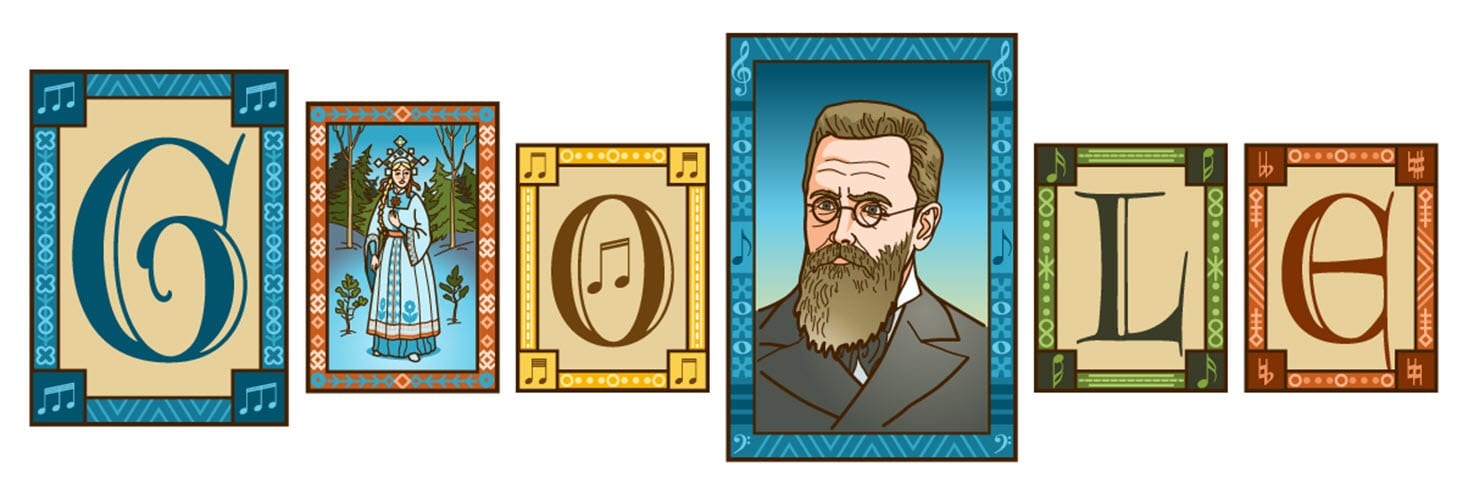Discovering the Life and Music of Nikolai Rimsky-Korsakov

Image Courtesy: Google Doodle
Nikolai Rimsky-Korsakov (18 March 1844 – 21 June 1908) was a Russian composer, a member of the group of composers known as The Five, a group of prominent 19th-century Russian composers who sought to create a distinctive national style of classical music.
Early Life And Education
Nikolai Andreyevich Rimsky-Korsakov, a renowned Russian composer, was born on March 18, 1844, in Tikhvin, near Novgorod, Russia. He hailed from an aristocratic family; his father was a government official with liberal views, and his mother was well-educated and musically inclined. Rimsky-Korsakov demonstrated musical talent early on but initially pursued a career in the navy, following in the footsteps of his uncle, an admiral, and his elder brother, a marine officer. At the age of 12, his family moved to St. Petersburg, where he entered the naval academy. It was during his adolescence, at 15, that he began taking piano lessons and learned the basics of composition. His life took a significant turn in 1861 when he met Mily Balakirev, a man of great musical culture. Under Balakirev’s mentorship, Rimsky-Korsakov began composing a symphony, marking the start of his journey into the world of music composition and orchestration.
Career And Achievements
Nikolai Rimsky-Korsakov, renowned for his distinctive style and contributions to Russian nationalism in music. His career began in the navy, which profoundly influenced his compositions, often reflecting his love for the sea. Rimsky-Korsakov’s mastery in orchestration is evident in works like “Scheherazade” and “Capriccio Espagnol,” which remain staples in the classical repertoire. His operas, including “The Golden Cockerel” and “Sadko,” showcase his use of folklore and fairy-tale elements, a hallmark of his style. As a member of “The Five,” he sought to create a unique Russian sound, free from Western influence. His dedication to education was equally significant; he became a professor at the Saint Petersburg Conservatory in 1871, where he taught future luminaries such as Igor Stravinsky and Sergei Prokofiev. Rimsky-Korsakov’s legacy extends beyond his compositions; he played a vital role in editing and completing works of his contemporaries, ensuring the preservation and continuation of the Russian musical tradition.
Notable Events And Milestones
Nikolai Rimsky-Korsakov was a monumental figure in the realm of classical music, particularly known for his work in orchestration and his role as a member of the composer group “The Five.” His life was marked by significant events and milestones that shaped not only his career but also the course of Russian music. His naval career, which began with his graduation from the Naval Academy in 1862 and included a three-year voyage aboard the clipper ship Almaz, profoundly influenced his music, leading to compositions rich with aquatic themes such as “Sadko” and “Scheherazade”.
Rimsky-Korsakov’s contributions to society and culture are immeasurable. He was a pioneer in integrating Russian folk music and lore into the classical tradition, creating a distinct nationalistic style. His operas and orchestral works often drew from fairy-tale and folk subjects, reflecting his belief in the importance of national identity in music. As a professor at the Saint Petersburg Conservatory, he influenced generations of composers, including Igor Stravinsky and Sergei Prokofiev, who would carry forward his legacy. His impact on history extends beyond music; he was a cultural icon who, through his compositions and teachings, helped to shape a Russian identity that was reflective of its people and traditions. Rimsky-Korsakov was awarded the Order of St. Vladimir and the Order of St. Stanislaus for his contributions to Russian culture and was elected to the Russian Academy of Sciences, underscoring his significance as a national figure.
Moreover, his editing of the works of his contemporaries and predecessors ensured that the music of “The Five” would be preserved and disseminated, further cementing his role in the development of Russian classical music. His textbook “Principles of Orchestration” remains a seminal work in the field, influencing not only Russian composers but also musicians worldwide.
Awards And Honors
- His orchestral compositions, such as “Capriccio Espagnol,” “Russian Easter Festival Overture,” and the symphonic suite “Scheherazade,” are staples of the classical music repertoire.
- Rimsky-Korsakov’s work in orchestration was highly influential, and he is celebrated for his use of fairy-tale and folk subjects in his compositions.
- He was also a professor of musical composition, harmony, and orchestration at the Saint Petersburg Conservatory, contributing significantly to the education of future composers.
- Rimsky-Korsakov’s contributions to music were recognized posthumously, as most of the awards and honors we know today did not exist during his lifetime.
- On 18 March 2014, Google celebrated Nikolai Rimsky-Korsakov’s 170th Birthday with a doodle.
Additional Resources
Books:
- “Principles of Orchestration” by Nikolai Rimsky-Korsakov, a classic text on orchestration with musical examples from his own works.
- A variety of books by Rimsky-Korsakov are listed on Goodreads, including “My Musical Life” and “Scheherazade, Op. 35”.
Documentaries:
- “The Best of Korsakov” is a YouTube video that provides an overview of Rimsky-Korsakov’s life and works.
- For performance-focused content, the recording of “Flight of the bumblebee” by the Russian National Orchestra is available on YouTube.
- A documentary glance at Rimsky-Korsakov’s pedagogical work can be found in an academic article on Academia.edu[.
Museums:
- The Rimsky-Korsakov Apartment and Museum in St. Petersburg is dedicated to the composer’s life and work, where visitors can explore the apartment where he spent the last fifteen years of his life.
- Wikipedia provides a detailed history and description of the Rimsky-Korsakov Apartment and Museum.
- For those interested in visiting, the museum’s location, opening hours, and contact information can be found on the Theatre Museum’s website.
Observer Voice is the one stop site for National, International news, Sports, Editor’s Choice, Art/culture contents, Quotes and much more. We also cover historical contents. Historical contents includes World History, Indian History, and what happened today. The website also covers Entertainment across the India and World.

